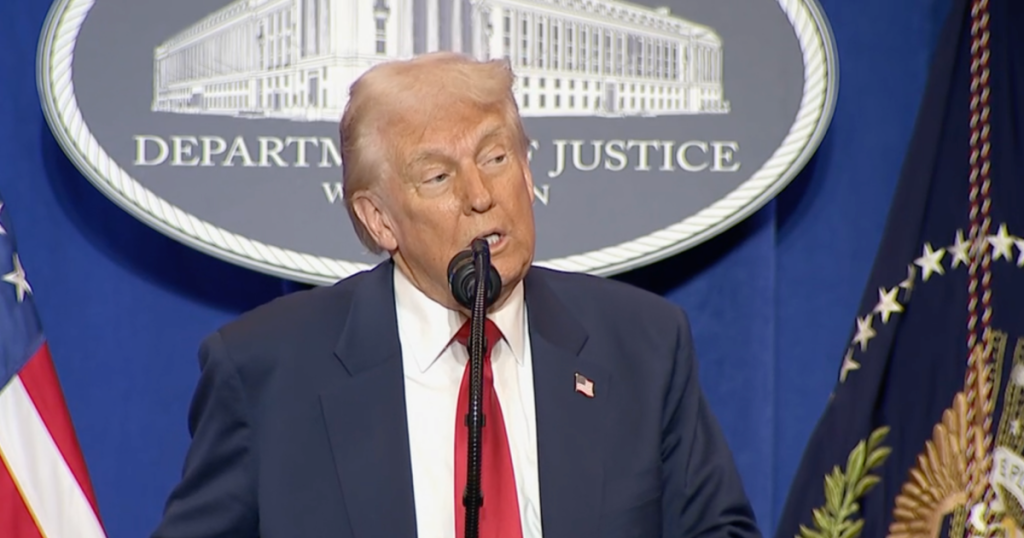President Donald Trump made a significant appearance at the Justice Department on Friday, marking a rare visit by a sitting president in over a decade. During his speech, he articulated a vision centered on combating crime and addressing immigration issues, while criticizing the previous administration’s handling of justice. His remarks signaled a potential shift in the department’s approach, as he emphasized restoring fairness in law enforcement amid ongoing scrutiny of his administration’s legal practices.
| Article Subheadings |
|---|
| 1) Overview of President Trump’s Remarks |
| 2) Background on Presidential Visits to the DOJ |
| 3) Reactions from the Opposition |
| 4) Implications for Future DOJ Policies |
| 5) Conclusion and Summary of Key Points |
Overview of President Trump’s Remarks
In a landmark event, President Donald Trump addressed the Justice Department, where he conveyed a vision aimed at transforming the department’s operations. He emphasized the importance of restoring integrity to the justice system, declaring, “We’re turning the page on four long years of corruption, weaponization and surrender to violent criminals.” His statements framed his administration’s philosophy moving forward, which includes a commitment to fair, impassioned justice provided under the rule of law. This speech aligns with Trump’s long-standing narrative that has critiqued the Department of Justice (DOJ) for being politically biased and ineffective.
Background on Presidential Visits to the DOJ
The tradition of U.S. presidents addressing the Justice Department is rare, with the last appearance by a sitting president occurring in 2015 when former President Barack Obama attended a ceremony honoring then-Attorney General Eric Holder. Prior to that, President George W. Bush visited the DOJ in 2001 for the renaming of the building to honor Robert F. Kennedy. These appearances are significant as they represent a symbolic connection between the executive branch and the nation’s legal institution. President Trump’s remarks signify a return to this tradition, framing his administration’s focus on law enforcement and legal integrity.
Reactions from the Opposition
Following President Trump’s address, reactions from Democratic lawmakers were swift and scathing. They accused him of undermining the integrity of the DOJ and breaking legal norms since the beginning of his presidency. Notably, Rosa DeLauro, the Ranking Member of the House Appropriations Committee, claimed that Trump had “broken the law on day one of his term.” Similarly, Grace Meng, a Democratic Representative, stated that the Trump administration has failed to respect the rule of law, emphasizing the perceived disconnect between Trump’s rhetoric of justice and actual policy practices. Such criticisms reflect a deep partisan divide concerning the administration’s approach to legal matters and the functionality of justice in America.
Implications for Future DOJ Policies
Trump’s remarks have prompted discussions about the potential reshaping of DOJ policies and procedures. His vision indicates a potential pivot towards a governance model that prioritizes what he describes as the “restoration of fair, equal and impartial justice.” Lawmakers and legal experts speculate that this might involve a significant overhaul of how the DOJ approaches criminal justice, particularly in cases where political motivations are perceived to influence legal outcomes. With the support of figures such as Attorney General Pam Bondi and FBI Director Kash Patel, the Trump administration may seek a more vigorous stance on crime and immigration, which could alter the trajectory of the DOJ’s role in American society.
Conclusion and Summary of Key Points
In summary, President Trump’s address at the Justice Department signals a critical juncture in the relationship between the executive branch and law enforcement. His speech highlights a vision focused on eradicating perceived corruption while advocating for a return to foundational legal principles. The backlash from opposition figures underscores the contentious atmosphere surrounding his administration’s actions and legal interpretations. As the Trump administration continues to grapple with its legacy, the implications of this vision for future DOJ policies will be closely observed and debated.
| No. | Key Points |
|---|---|
| 1 | President Trump’s remarks represent a significant return of a sitting president to the Justice Department. |
| 2 | The President emphasized the need to eliminate corruption within the justice system. |
| 3 | His address has drawn sharp criticism from Democratic lawmakers. |
| 4 | The implications of his vision may lead to significant changes in DOJ policies and operations. |
| 5 | The speech highlights ongoing tensions regarding the administration’s relationship with the justice system. |
Summary
Overall, President Trump’s visit to the Justice Department and his subsequent remarks reflect the administration’s commitment to reshaping justice practices in America. His calls for a new chapter resonate amid criticisms of politicization and corruption. As public discourse continues, the administration’s direction will likely shape the future of law enforcement in significant ways, creating a pivotal moment for the relationship between justice and governance in the United States.
Frequently Asked Questions
Question: Why did President Trump give a speech at the Justice Department?
President Trump delivered a speech at the Justice Department to outline his vision for fighting crime and restoring integrity within the justice system.
Question: What key issues did Trump address in his remarks?
In his speech, he addressed issues such as corruption, the politicization of justice, and the need for impartiality in law enforcement.
Question: How did his remarks impact reactions from the opposition?
Opposition lawmakers critiqued Trump’s address, accusing him of undermining the rule of law and calling into question the legitimacy of his administration’s actions regarding justice.


